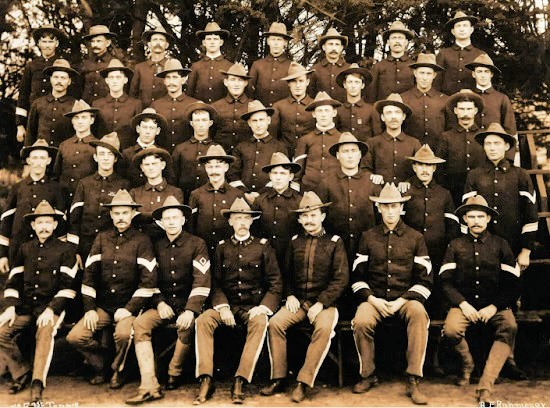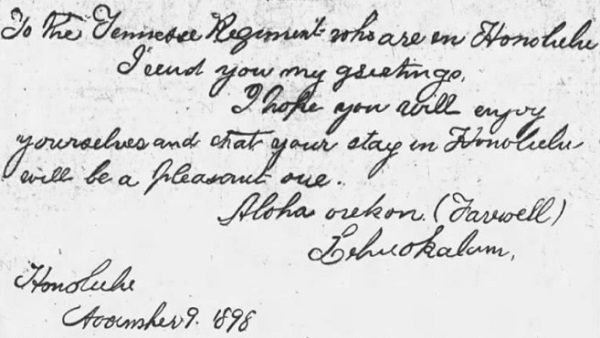


The First Tennessee Volunteer Infantry saw service as part of the U.S. occupation forces in Philppines and then saw service in the Philippine American War.
The History:
The First Tennessee Volunteer Infantry was mustered into the federal
service at Nashville, Tennessee between May 19, and May 26, 1898, under
the command of Col. William C. Smith. Smith was an architect by
training, and had served as a Confederate officer in the American Civil
War. At the time of mustering in, the regiment consisted of forty-seven
officers and 975 enlisted men. Companies were formed in Clarksville,
Columbia, Lawrenceville, McMinnville Nashville, Shelbyville and
Springfield.
After being fully mustered, the regiment was ordered west to San Francisco. The regiment departed Nashville on June 10 and arrived in San Francisco a week later. The Tennessee men were assigned to the Second Independent Battalion of the Eighth Army Corps.
The regiment was initially stationed at Camp Merritt. Only about two-thirds of the regiment were equipped with arms, something expected to be remedied at Camp Merritt. Also, on arrival, it was found that there was an outbreak of measles among the men, sending some men immediately to the field hospital. While in San Francisco, the Red Cross supplied each man with what today would be termed a “dog tag” with the regiment number, company designation and the man’s roster number, as well as a flannel night cap and sewing kit. Additionally, every man in the regiment was given a free trip to the “sutro baths” at the famous Cliff House hotel. The baths were inside of a massive glass structure and had seven large swimming pools of various temperatures, as well as sliding boards, swings etc. Also, the facility had exhibits on natural history.As sanitary conditions began to deteriorate at Camp Merritt, the 1st Tennessee was relocated to the Presidio in early August, which was deemed to be much healthier. Around the same time, four hundred of the men were issued overcoats. Apparently severe colds and pneumonia were becoming common among the ranks of the 1st Tennessee. It was attributed to the men not being acclimated to the California climate and the heavy drilling. In fact, it was likely that the men were being exposed to different forms of common viruses that the men had not before been exposed to in Tennessee.
While the regiment was in San Francisco, on August 12, an armistice
was reached between the United States and Spain ending the war’s
fighting.
Unfortunately, the 1st Tennessee Volunteer Infantry was involved in several incidents that damaged its reputation while in San Francisco. Apparently there was an altercation with an African American man in the regiment’s camp. The man, a crab seller named Danny Thomas, was involved in some sort of a dispute. In the altercation rumor spread that Thomas had killed one of the egiment's men, which was entirely untrue. On hearing the rumor, a mob, made up mainly men of the Tennessee regiment, attempted to lynch Thomas. Thomas was taken by the camp guard, but was still attacked and hit on the head with an iron ring bolt. The man wielding the piece of iron was private Andrew W. Scruggs of Company E. Thomas survived. Scruggs was given a sentence of three months at hard labor at Alcatraz, was dishonorably discharged and forfeited his pay. Scruggs admitted that he got off with a light sentence.
Shortly afterwards, Private William Rosser of the 1st Tennessee was
visiting the Spreckles Market in San Francisco. Rosser was a graduate of
Vanderbilt University in medicine. Unfortunately, at this moment he was
drunk. He saw a mutton pie and began to "help himself." When he was
confronted about paying for what he had eaten by one of the stand's
employees, Henry Hilderbrant, Rosser simply pulled out his revolver and
fired. The shot killed Hilderbrant instantly.
These two incidents were gave the regiment a bad reputation, to the point that Col. Smith felt the need to explain to the newspapers that the men involved in these incidents were only a small minority of the regiment. Still, the reputation persisted. When the regiment eventually arrived in Honolulu, even the newspaper reporter there had heard about these events and approached Col. Smith about them.
The regiment was ordered to Manila, Philippines. On October 30, the regimental field and staff, as well as companies A, B, C, E, F, L, and M steamed out of San Francisco aboard the transport ZEELANDIA, arriving in Manila nearly a month later, on November 29. The shipped had stopped at Honolulu, Hawaii, enroute. The remaining companies – companies D, G, H, I, and K left San Francisco aboard the transport CITY OF PUEBLA on November 6, arriving at Manila on December 6. Interestingly, while he was in Hawaii, Walter Parrish, the 1st Tennessee's regimental clerk, decided to visit the deposed Hawaiian Queen Liliʻuokalani. He managed to visit the residence in which she was living and explained that his regiment was only to be present for a few days and asked to meet the former queen. Quite oddly, Parrish had phonographic equipment with him that played music and also recorded sound. He asked the queen if she would give a toast to the 1st Tennessee Volunteer Infantry into the equipment, which she agreed to do. She also wrote a noted for him apparently stating the same words she had recorded via the phonographic equipment. It was considered to be very unusual for her to grant a request for a visit.

The note from Queen Liliʻuokalani
On December 10, 1898, the Treaty of Paris was signed ending the Spanish American War.
The 1st Tennessee Volunteer Infantry remained in Manila and at Cavite until the outbreak of the Philippine American War on February 4, 1899. Among other duties around Manila prior to the outbreak of the Philippine American War, portions of the regiment were assigned to guard the penitentiary, with orders to shoot to kill anyone who tried to escape. The regiment was active in the early actions of the war at Manila on February 4 to 6. Unfortunately Col. Smith died of what was thought to be a cerebral hemorrhage or stroke on February 5 while on the front firing line.Correspondence relating to the War with Spain And Conditions Growing Out of the Same Including the Insurrection in the Philippine Island and the China Relief Expedition. Vol. 1 (Washington: Government Printing Office, 1902) 594.
“Brave Battalions from Tennessee,” San Francisco Call. June 17, 1898, 5.
“Camp Merritt,” San Francisco Call. June 17, 1898, 5.
“Col. Smith Writes,” The Nashville American. July 26, 1898, 5.
“Danny Thomas and Military Justice mills,” The Examiner (San Francisco). August 17, 1898, 11.
“Fell Dead on Firing Line,” The Weekly Sentinel (Knoxville, Tennessee). February 8, 1899, 2.
Hodge, Jim, Photo of Company F.
“Sutro Baths History,” https://www.nps.gov/goga/learn/historyculture/sutro-baths.htm
“He Once Wore the Gray,” San Francisco Call. June 18, 1898, 7. (image of Smith)
"Our Tennessee Boys," The Nashville Banner. March 18, 1899,
16.